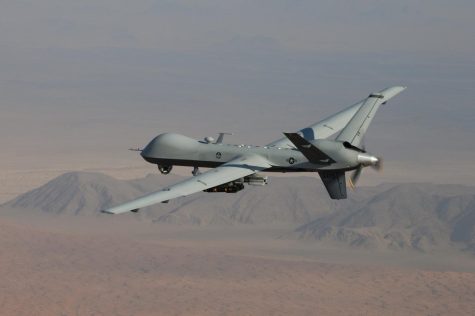The Drone Zone: Renewed Conflict Between Russia and the US
A recent drone collision between Russia and the US is drawing much international attention. How do disputes like these change the dynamic of relations between the global superpowers?
May 1, 2023
Ukraine and Russia have been fighting for fourteen months now: over Ukraine’s request to enter NATO (the North Atlantic Treaty Organization) and the potential of NATO to expand further eastward, threatening Russia. In recent news, a similar kind of tension seems to be brewing between the United States and Russia, reminding many of the United States’ rocky history with the country.

During the entirety of the Russia-Ukraine War, the United States had no direct contact with Russia until March 14, 2023, when a US MQ-9 Reaper Drone experienced a run-in with two Russian SU-27 jet aircrafts over the Black Sea. According to a statement from the US European Command, the Russian aircraft flew into the vicinity of the drone for upwards of half an hour before one of the jets flew in front and dropped fuel on the drone several times. One of the jets then collided with the drone, resulting in the drone dropping into international waters where it was then completely lost, according to Air Force General James B. Hecker.
In conflicting statements, both Russia and the US addressed the incident. Both responses were semi-hostile toward one another, both claiming the other violated their security. Using words such as “reckless” and “unacceptable,” American officials involved in the collision highlighted not only their grievances about the incident but also the growing tensions between both nations over the Ukraine war.
Russia claimed that the United States was in violation of restricted Russian airspace, which they claimed justified their actions. In a statement to TASS news, a state-run Russian news station, Russia’s deputy foreign minister Sergey Ryabkov said, “Russia’s security will be 100% ensured by all means available to us. And no American drones … can shake our determination.”
In contrast, the US command of Air Force Europe and Air Force Africa said in a statement, “Our MQ-9 aircraft was conducting routine operations in international airspace when it was intercepted and hit by a Russian aircraft, resulting in a crash and complete loss of the MQ-9.” After the loss of the $35 million dollar drone, the US reportedly called upon Russian Ambassador Anatoly Antonov, to express their “strong objections” to Russia’s potentially alarming maneuver.
This is not the first time that US-Russia foreign relations have been put in jeopardy recently. When Russia declared war upon Ukraine, the US imposed costs on Russia through sanctions and export control actions in retaliation against their aggression. During the war, the US continued to supply Ukraine with security assistance, including more than $75 billion dollars worth of defense weaponry, an action which Russia strongly condemned.
The US’s history of tension with Russia goes back further than just the last year —all the way back to the Cold War. Through arms and space races that lasted from the 1950s through the 1990s, Russia and the United States engaged in a static battle, working to best each other’s military and technological developments. From the Cold War to the present, there has not been any active conflict between the two nations; however, this political history cannot be erased easily.
Recently, the Black Sea has been valued for its ports and energy supply, which has sparked a renewed conflict in interests between Russia and the US. The drone collision happening here has increased bipartisan American interest in countries who border the Black Sea, most of which are allies of the United States.
The rough history between both countries bleeds into the lives of those who live or work in Russia, so much so that several prominent American citizens have been arrested and detained in Russia, among them WNBA player Brittney Griner, now released, and Wall Street Journal reporter Evan Gershkovich, still being held pending trial. While those arrests might not seem directly related, the underlying cause for both illustrates the rising aggressions between Russia and the U.S.
Officials of both nations claim they do not want to escalate the situation further. However, indirect statements and actions indicate otherwise. Neither country has halted drone operations over the region, signaling that this may not be an isolated event. In fact, Ukrainian officials warned that more incidents in the Black Sea will be “inevitable” as long as Russia continues to control Crimea.
This incident, though small, may be the signal that foreign relations with Russia will continue to deteriorate in the future. If the US and Russia were on rocky grounds to begin with, it’s time to bunker down, because it looks as though more tremors may be headed our way.